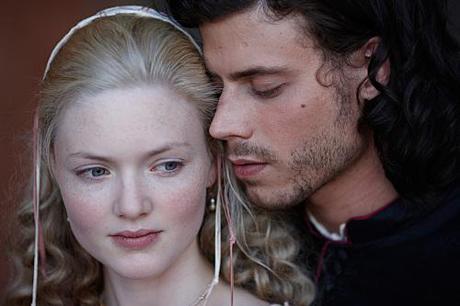It’s a bit difficult to know where this episode technically began, since Showtime decided to run the first two installments as one massive premiere (much like Starz did with “Camelot”). I would rather they just label the entire thing as the first episode with a single title in such cases, but here we are. As a result, I’m essentially considering the last 45 minutes or so as “The Assassin”, with little else to use as a benchmark.

In essence, the same issues that plagued the first half of the premiere continue to fester here, but I would wager that there’s even more troubling detail to consider. I’ll start with Rodrigo’s sudden but inevitable affair with Giulia Farnese, a lovely young woman who has lost interest with her husband but not carnal pleasure. It’s like dangling bait in front of a starving shark, so Rodrigo’s chastity vow doesn’t last very long. This is sure to make things uncomfortable with the mother of Rodrigo’s children, Vanozza.
It’s right out of the playbook from “The Tudors”, but there’s one major flaw in this particular scenario. When Henry was running about with mistresses and generally ensuring that the skin quotient on the show met audience approval, it worked because the character (and actor) could pull off the necessary acrobatics. Jeremy Irons makes a great papal Godfather, but there’s only so much he can do in a love scene. Neil Jordan tries very hard to make it sensual anyway, focusing a lot on Lotte Verbeek’s luminous form, but this illicit affair falls flat. (The tense lovemaking of the servant girl and the assassin, later in the episode, is much more effective.)
Meanwhile, the tension between Rodrigo and Cesare also falls flat, because while it is clear from history that the Borgias wanted to play all the angles, having key players in religious, political, and economic sectors of the realm, I’m really not all that interesting in hearing Cesare whine about his role in the master plan. Especially when I know he eventually does take a more political direction, becoming an abject lesson in the downside of inherited power ala Machiavelli’s “The Prince”.
Similarly, I noted in the premiere that I was disappointed with the portrayal of Lucretia, who is historically known to be more of a femme fatale and scheming seductress. Setting aside the idea that she is supposed to be 14 at this point, which doesn’t quite matter when taking that society and timeframe into account, she’s played more as unstable and spoiled than purposefully desirous of position and power.
Historically, did one of Rodrigo’s mistresses really teach Lucretia how to use feminine wiles? I don’t recall, and it’s probably a matter of speculation, but that doesn’t quite track with her seemingly-purposeful seduction of Cesare. Every time she plays with Cesare’s affections, she seems to be honing her craft, yet in other instances, she’s played as the innocent. Which is it?
And that’s the issue I have with the series, right from the start. The Borgias are supposed to have enough power and influence for Rodrigo to buy the papacy through simony and violence. Yet other than Rodrigo, no one else in the family seems ambitious and confident enough for any of that to be credible. I get the feeling the writers took this direction so that the characters could evolve for the sake of the audience, rather than be all on the same page right away, but that could be a critical flaw.
If anything, the writers seem to want to have their cake and eat it, too: patterning the Borgias as an old-school version of the Sopranos, without having half the cast already deep in the family business. My hope is that the pace will be similar to that of “The Tudors”, especially in later seasons, where they jumped forward in time as needed to focus on the most interesting events. But given what was shown in the previews, that may not be the case.
Writing: 1/2
Acting: 2/2
Direction: 2/2
Style: 1/4
Final Rating: 6/10

